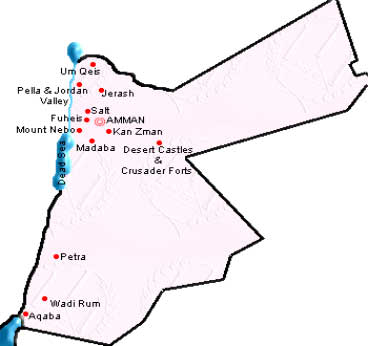

Tomatoes are among the most important vegetables grown in Jordan. There are two areas where tomatoes are grown. From September to May in the Jordan Valley, and from April to August in the highlands. The total area planted with tomatoes was 8.1 hectares in 2000. Most of tomatoes produced are consumed fresh. Few are used for processing or canning. Although Jordan produces more tomatoes than can be locally consumed, few tomatoes are exported to neighboring countries. In 1999, only 2.2 tons were exported to Saudi Arabia, Oman and United Arab Emirate.


2- Tomato varieties grown in Jordan
Cultivar |
Company |
Origin |
|
1 |
Shams | Sun Seed | USA |
2 |
RS 589956 | Royal Sluis | Holland |
3 |
Jawaher | Royal Sluis | Holland |
4 |
Cassandra | Royal Sluis | Holland |
5 |
Sened | Edel Zaden | Holland |
6 |
Sara | Hi-Tech Seeds | Denmark |
7 |
Faridah | Golden Valley | USA |
8 |
Cheyenne | Novartis | Holland |
9 |
Shiva | Novartis | Holland |
10 |
GS 12 | Novartis | Holland |
11 |
Vagos | Novartis | Holland |
12 |
Asco Top | Novartis | Holland |
13 |
F1508 | Novartis | Holland |
14 |
Guardian | Yates | Australia |
15 |
Hymar | Clause | France |
16 |
Cecilia | GSN | France |
17 |
Rocky | GSN | France |
18 |
Monix | Nunhems | Holland |
19 |
Kabier | Nunhems | Holland |
20 |
Supper Red | Asgrow | USA |
21 |
Pretty | Enza Zaden | Holland |
22 |
Gironda | Enza Zaden | Holland |
23 |
California | California | USA |
24 |
Ghalia 281 | Bakker Brothers | Holland |
25 |
Danny | Evergrow Seed | Tiwan |
26 |
Indiana | Western Seed | Holland |
27 |
Badrieh | U S Agriseeds | USA |
28 |
Hana | U S Agriseeds | USA |
29 |
Alambra | Tezier | France |
30 |
Wafa | Seed Export | USA |
3- Problems affecting tomato production other than TYLCV
- Water
- Soil Condition
- Diseases other than TYLCV
- Marketing
4- TYLCV status in Jordan
In Jordan, the incidence of the disease caused by TYLCV depends on the population density of the whitefly vector (Bemisia tabaci). For example, 90 to 100% loss in the yield is expected when tomatoes are grown in the open field between September and May. This time coincides with high population of the whitefly. On the other hand, the whiteflies reach high populations in the highlands in spring when tomatoes are reaching maturity. For tomatoes grown under plastic houses, it is much easier for farmers to manage and reduce the damage caused by TYLCV. Different cultural practices showed good effect in the reduction of yield losses. These measures include spraying with insecticides, use of yellow traps, use of double door system for the plastic houses, weed control and delay the planting date to escape the high population of the whiteflies. In addition to these measures and since cucumbers are immune to TYLCV, farmers in Jordan interplant tomatoes with cucumber plants in open field. In this case cucumber plants act as trap for the whiteflies. In addition, most farmers plant tomatoes under tunnels to prevent the contact between tomato plants and whiteflies. Furthermore, it has been reported that planting tomatoes using plastic mulches reduce the incidence of TYLCV. These mulches reflect the sun light around the plants, which causes irritation for the whiteflies. Some agricultural companies offer tomato cultivars with different level of resistance to TYLCV. However, no studies have been made by the Ministry of Agriculture or any other institution on these cultivars nor have they been tested for their performance and resistance under high inoculum pressure in the Jordan Valley. Although breeding programs for TYLCV resistance have started in Jordan in the mid 1980s no cultivars have been developed for commercial use. The contribution of private sector (companies) and the government (Ministry of Agriculture) in breeding of tomatoes against TYLCV in Jordan is minimal. This is due to financial constrains and lack of scientists with good experience in breeding vegetables against plant diseases.
For more Information about TYLCV status in Jordan and for the development of TYLCV resistant tomato cultivars; contact: Dr. Ghandi Anfoka, E-Mail: Anfoka@joinnet.com.jo